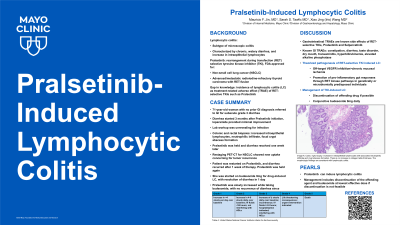Tuesday Poster Session
Category: Colon
P3803 - Pralsetinib-Induced Lymphocytic Colitis: A Case Report
Tuesday, October 29, 2024
10:30 AM - 4:00 PM ET
Location: Exhibit Hall E

Has Audio

Mauricio Jin, MD
Mayo Clinic
Rochester, MN
Presenting Author(s)
Mauricio Jin, MD, Sarah Tawfic, MD, Xiao Jing (Iris) Wang, MD
Mayo Clinic, Rochester, MN
Introduction: Lymphocytic colitis (LC) is a subtype of microscopic colitis, often associated with chronic watery diarrhea and characterized by an increase in intraepithelial lymphocytes. While various medications are implicated in drug-induced lymphocytic colitis, its incidence as a treatment-related adverse effect of RET-selective tyrosine kinase inhibitors is not known. We report a case of pralsetinib-induced LC in a patient with stage 3C Non-Small Cell Lung Cancer (NSCLC).
Case Description/Methods: A 71-year-old woman with no prior GI diagnoses was seen in clinic for subacute diarrhea. She was started on pralsetinib, a RET selective tyrosine kinase inhibitor (TKI) 400mg daily after work-up for thoracic back pain and dry cough revealed stage 3c NSCLC. Restaging CT 2 months after initiating pralsetinib demonstrated near complete tumor response.
Three months after initiating pralsetinib, patient experienced lower abdominal cramping, anorexia, and persistent grade 3 diarrhea. Loperamide only minimally improved her diarrhea. Subsequent laboratory workup was negative for infection. She underwent EGD and colonoscopy, which showed mild scattered erythema in the rectosigmoid. Colonic and rectal biopsies demonstrated increase in intraepithelial lymphocytes with associated neutrophilic infiltrate and focal crypt abscess formation throughout the colon and rectum, consistent with lymphocytic colitis. Her pralsetinib was held and her diarrhea resolved one week later. Restaging PET CT demonstrated new uptake in the left lung concerning for tumor recurrence, and she was restarted on a reduced dose of pralsetinib 200mg after holding for two weeks. At dose escalation to 300mg one week after, she again developed grade 2 diarrhea. Pralsetinib was held again and she was initiated on budesonide 9mg for drug-induced lymphocytic colitis, with resolution of her diarrhea in 1 day. She then restarted her pralsetinib 200mg again with budesonide cotreatment, and tolerated dose escalation to 300mg one week later with no recurrence of diarrhea.
Discussion: This case highlights pralsetinib-induced lymphocytic colitis as a cause of persistent diarrhea. Known GI adverse events of the RET-selective TKIs, pralsetinib and selpercatinib are numerous but to date LC has not yet been reported. Discontinuation of the offending agent is suggested, but if not possible, budesonide 9mg can be used in conjunction. Further studies are needed to elucidate the mechanisms underlying pralsetinib induced LC.
Disclosures:
Mauricio Jin, MD, Sarah Tawfic, MD, Xiao Jing (Iris) Wang, MD. P3803 - Pralsetinib-Induced Lymphocytic Colitis: A Case Report, ACG 2024 Annual Scientific Meeting Abstracts. Philadelphia, PA: American College of Gastroenterology.
Mayo Clinic, Rochester, MN
Introduction: Lymphocytic colitis (LC) is a subtype of microscopic colitis, often associated with chronic watery diarrhea and characterized by an increase in intraepithelial lymphocytes. While various medications are implicated in drug-induced lymphocytic colitis, its incidence as a treatment-related adverse effect of RET-selective tyrosine kinase inhibitors is not known. We report a case of pralsetinib-induced LC in a patient with stage 3C Non-Small Cell Lung Cancer (NSCLC).
Case Description/Methods: A 71-year-old woman with no prior GI diagnoses was seen in clinic for subacute diarrhea. She was started on pralsetinib, a RET selective tyrosine kinase inhibitor (TKI) 400mg daily after work-up for thoracic back pain and dry cough revealed stage 3c NSCLC. Restaging CT 2 months after initiating pralsetinib demonstrated near complete tumor response.
Three months after initiating pralsetinib, patient experienced lower abdominal cramping, anorexia, and persistent grade 3 diarrhea. Loperamide only minimally improved her diarrhea. Subsequent laboratory workup was negative for infection. She underwent EGD and colonoscopy, which showed mild scattered erythema in the rectosigmoid. Colonic and rectal biopsies demonstrated increase in intraepithelial lymphocytes with associated neutrophilic infiltrate and focal crypt abscess formation throughout the colon and rectum, consistent with lymphocytic colitis. Her pralsetinib was held and her diarrhea resolved one week later. Restaging PET CT demonstrated new uptake in the left lung concerning for tumor recurrence, and she was restarted on a reduced dose of pralsetinib 200mg after holding for two weeks. At dose escalation to 300mg one week after, she again developed grade 2 diarrhea. Pralsetinib was held again and she was initiated on budesonide 9mg for drug-induced lymphocytic colitis, with resolution of her diarrhea in 1 day. She then restarted her pralsetinib 200mg again with budesonide cotreatment, and tolerated dose escalation to 300mg one week later with no recurrence of diarrhea.
Discussion: This case highlights pralsetinib-induced lymphocytic colitis as a cause of persistent diarrhea. Known GI adverse events of the RET-selective TKIs, pralsetinib and selpercatinib are numerous but to date LC has not yet been reported. Discontinuation of the offending agent is suggested, but if not possible, budesonide 9mg can be used in conjunction. Further studies are needed to elucidate the mechanisms underlying pralsetinib induced LC.
Disclosures:
Mauricio Jin indicated no relevant financial relationships.
Sarah Tawfic indicated no relevant financial relationships.
Xiao Jing (Iris) Wang indicated no relevant financial relationships.
Mauricio Jin, MD, Sarah Tawfic, MD, Xiao Jing (Iris) Wang, MD. P3803 - Pralsetinib-Induced Lymphocytic Colitis: A Case Report, ACG 2024 Annual Scientific Meeting Abstracts. Philadelphia, PA: American College of Gastroenterology.
